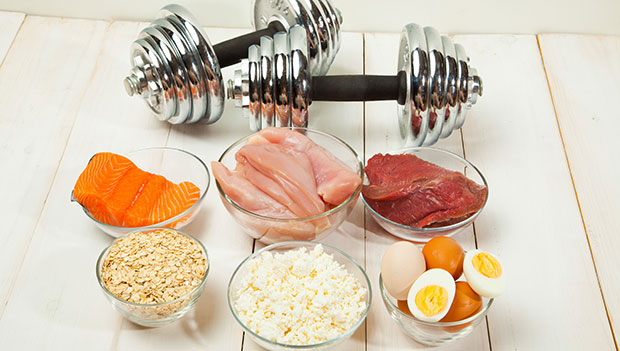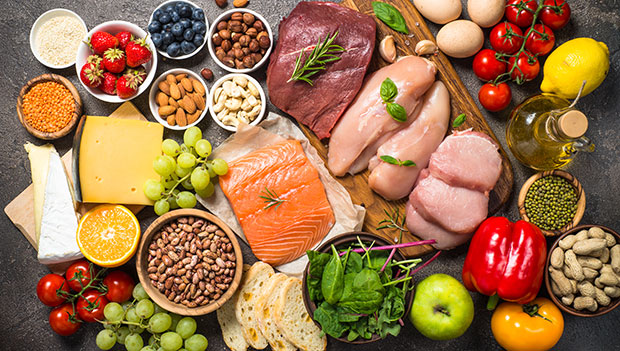
How to Build Muscle | Muscle-Building Nutrition | Muscle-Building Supplements | Hypertrophy Training | Strength Training | Chest Workouts | Back Workouts | Arm Workouts | Shoulder Workouts | Leg Workouts
Have you ever looked around the gym, wondering, "How can I look like that?" You're putting in the time, dedicating four to six days per week to weight training, HIIT classes, maybe even CrossFit. And while you've shed some pounds and toned up a bit, your muscles are still smaller than you'd like them to be.
Muscle building is a science. It's more than just lifting weights and eating to hit minimum macronutrients, it requires conscious dietary changes and proper nutrition. And in some cases, muscle building is a game of genetics lottery, where some people seem predisposed to build muscles bigger and faster. Muscle growth is a complicated formula, where your effort at the gym (or wherever you train) is only part of the equation.
Providing your body with the right fuel and muscle-building nutrition is equally important. To understand what muscle-building nutrition is, we're breaking down the science behind a muscle-building diet, the right protein for muscle gain, and what factors you need to consider when you're trying to bulk up.
Muscle-Building Basics
First, let's talk about the most basic requirements of a muscle-building diet:
Increased Protein Intake
Dietary protein is required for protein synthesis or the creation of new muscle in the body. So, how much protein per day do you need to build muscle?
According to the National Academy of Science's Food and Nutrition Board, which sets the Recommended Dietary Allowance (RDA), the average adult with low to average activity levels requires 0.8 grams of protein per kilogram of body weight (or 0.36 grams per pound of body weight) per day just to maintain muscle mass.
To reach a state of muscle growth and assume intense physical activity, that requirement doubles to 1.6 grams of protein per kilogram of body weight (0.72 grams per pound) per day. And according to many fitness professionals, that requirement is closer to 1 gram of protein per pound of body weight per day.
For an average person of 150 pounds, that's between 108 and 150 grams of protein per day. To put things in perspective, one 8-ounce steak provides about 55 grams of protein, and one whole egg provides about 12 grams of protein, according to the USDA.
Increased Total Macronutrient Intake
The body will only build muscle when it is in a state of caloric surplus. If you are eating at or below your body's normal caloric needs, no excess nutrients are shuttled to the muscles for muscle building. Therefore, total caloric intake must be above normal maintenance levels.
Depending on your fitness goals and how aggressive your training routine is, this increase can range from 15-35 percent, with the majority of excess calories coming from complex carbohydrates.
Carbohydrates are the main source of energy for active muscles. Carbohydrates are stored in the body as glycogen, a compound that can quickly be used as energy to fuel the muscles during exercise. Without sufficient glycogen, the body will begin to break down protein (dietary or muscular), which can also be made into glycogen, to refuel glycogen stores.
For your body to direct excess proteins to be used for muscle synthesis and to avoid muscle breakdown for energy during exercise, you must consume adequate carbohydrates. While this may feel like an excuse to eat donuts every morning, remember that complex carbohydrates (like sweet potatoes) provide the body with far superior nutrition (i.e., better health and better results) than simple, sugary carbohydrates.
With the soaring popularity of carbohydrate-restricted diets, such as the Keto diet, it is necessary to address how low-carb diets affect muscle building. Some studies have shown that it is possible to maintain a ketogenic diet while successfully building muscle. Other studies have shown that a ketogenic diet could result in a "blunted" increase in muscle mass.
If you follow a carbohydrate-restricting diet and are trying to build muscle, your results may depend on your bio-individuality or your body's own ability to successfully adapt to the diet and the alternative source of energy from ketones. If you are feeling sluggish or weak during or after workouts, consider carb cycling or working with a qualified medical professional who can help you reach your goals in a more healthy way.
Actual macronutrient needs vary based on age, sex, body composition, activity levels, digestive health, and many other factors. For this reason, it is suggested that you use a nutrition calculator to determine your macronutrient needs to successfully dial in your muscle-building nutrition needs.
Beyond the Basics: Amino Acids and Protein Synthesis
All proteins are made of amino acids, whether in animals or plants. There are 20 recognized amino acids, 9 of which are essential amino acids. The body cannot make an essential amino acid, so it must be added to the diet. The liver can synthesize the remaining amino acids in the human body.
Daily protein intake recommendations are based on the sum of minimum essential amino acid requirements. If a person does not consume adequate levels of essential amino acids in their diet, they can experience significant symptoms of various health problems, including heart disease, arthritis, poor healing, mental health problems, insomnia, and many other conditions.
Protein synthesis is the act of combining amino acids in a specific order to make new proteins. Our body uses new proteins to repair damaged skeletal muscle, making the muscle larger and stronger.
Besides repairing and building muscle, amino acids also contribute to numerous other essential bodily functions. Proteins repair and build other structural tissues, such as collagen and keratin. Amino acids are enzymes that digest food and assist with energy production and blood clotting. Amino acids are also made into hormones communicating important messages, including insulin and human growth hormone (HGH). They are a major component of blood, hemoglobin, which carries oxygen from the lungs to cells.
The human body is virtually in a constant state of repair and cell turnover. According to an article in Scientific American, "About 330 billion cells are replaced daily, equivalent to about one percent of all our cells. In 80 to 100 days, 30 trillion will have replenished—the equivalent of a new you."
Because of this constant turnover, the body has a minimum daily need for dietary protein, even for those living sedentary lives. This requirement is so important that the body will begin to digest its muscles without adequate dietary amino acids in its endless need for nitrogen and new amino acid building blocks.
For this reason, it is impossible to build muscle if dietary intake of quality protein is not above daily maintenance needs for essential amino acids.

Measuring the Value of Amino Acids by Food Source: What Type of Protein is Best for Muscle Building
For your body to make all of the proteins that it needs and to build muscle, it must receive adequate amounts of all of the essential amino acids from your diet.
Protein from animal sources contains all essential and nonessential amino acids. And while essential amino acids are present in plant foods, no single plant food contains all of the essential and nonessential amino acids.
For this reason, animal protein is considered "complete" protein, and plant protein is considered "incomplete" protein.
Equally important, the amino acids found in protein from animal foods are much more bioavailable—meaning easier to digest and to be used by the human body—than those in protein from plant foods.
This measurement of digestibility and bioavailability, known as the net protein utilization (NPU), is one example of several different measurements used to evaluate the quality of a protein as measured by its value to the human body.
Using this measurement, whole eggs are the single most effective protein for the human body, scoring a 94 NPU. The second most effective is whey protein, at 92 NPU. Plant foods, in comparison, provide significantly less effective proteins for the human body. Wheat gluten (used to make seitan) scores 67 NPU, and soy scores 61 NPU.
Considering these measurements, vegetarians can consume adequate amounts of essential and nonessential amino acids if a reasonable effort is made to make their diet diverse and nutrient-dense, especially if eggs and milk are included. However, following a true vegan diet requires significantly more effort and knowledge of nutrition and has the potential to leave the body deficient in many nutrients.
A diet rich in quality animal foods, especially eggs, provides the most bioavailable, digestible, and dense protein sources for muscle growth. Look for high-quality, pasture-raised, or wild-caught proteins for the healthiest animal proteins containing the highest concentrations of important vitamins and healthy, anti-inflammatory fats.
BCAAs: Key Amino Acids for Muscle Growth
Five specific amino acids contribute the most to muscle growth. These five are known as Branched-Chain Amino Acids (BCAAs), named for the branch in their carbon structures.
- Alanine (non-essential)
- Carnitine (non-essential)
- Isoleucine (essential)
- Leucine (essential)
- Valine (essential)
Collectively, these five BCAAs are known to stimulate and fuel anabolic reactions (protein building), increase the re-utilization of amino acids, and reduce the catabolic reaction (protein breakdown) when a muscle is under stress (such as during intense exercise).
Leucine, in particular, has received significant attention for its ability to stimulate the acute anabolic (muscle building) response.
Supplements for Muscle Growth
Because the body cannot manufacture isoleucine, leucine, and valine, these three essential BCAAs are commonly supplemented by bodybuilders and other athletes. BCAA supplementation has been shown to increase available energy, increase endurance, stimulate protein synthesis, reduce muscle pain following exercise, and protect against muscle breakdown under stress.
It is worth noting here that studies have shown that supplementing with leucine alone (as some muscle-growing supplements are sold) is not an effective means of stimulating muscle growth. This is likely because leucine alone does not contain enough "building blocks" for sustained muscle protein synthesis. Rather, the full array of BCAAs is necessary to carry out muscle hypertrophy.
Another lesser-known supplement for muscle growth is beta-hydroxy-beta-methylbutyrate, also known as HMB. HMB is a metabolite of leucine and has been the subject of numerous studies demonstrating its ability to increase exercise performance and promote muscle cell growth. HMB, like BCAAs, has been shown to reduce catabolic (breakdown) effects and stimulate muscles' anabolic (building) effects. Quality HMB supplements will include vitamin D, as it synergizes with HMB.
Vitamins and Minerals for Muscle Growth
The two most important nutrients that assist in protein metabolism are vitamin C and vitamin B6 (pyridoxine), according to Eric R. Braverman, M.D., in his book, "The Healing Nutrients Within."
Vitamin C plays an important role in the absorption of amino acids, and vitamin B6 is essential for transporting amino acids from the intestines to the bloodstream. B6 is the cofactor for the enzymes that assist in building and breaking down amino acids. According to Braverman, "a deficiency of pyridoxine [B6] in the body produces profound effects upon amino acid metabolism."
Other important nutrients include vitamin B1 (thiamine), vitamin B2 (riboflavin), vitamin B3 (niacin), copper, magnesium, biotin, and glutamic acid.
Ensuring you consume sufficient amounts of these nutrients, either from whole foods or supplements, is important to hitting your muscle-building goals.
Final Takeaway
What you eat does matter. It's not just about hitting your macros, it's about providing your body with what it needs to complete the complicated chemistry of protein synthesis while resisting or minimizing protein breakdown.
For truly enhanced muscle building, along with your muscle-building workouts, it is important to support your body with adequate protein, carbohydrates, and fats from quality sources. The most bioavailable and digestible proteins, particularly eggs and whey protein, come from animal food sources. Vegetables provide adequate protein, but only when combined to create complete proteins. Supplementing with BCAAs and/or HMB is effective and safe for an extra boost to your muscle-building diet.
How to Build Muscle | Muscle-Building Nutrition | Muscle-Building Supplements | Hypertrophy Training | Strength Training | Chest Workouts | Back Workouts | Arm Workouts | Shoulder Workouts | Leg Workouts


